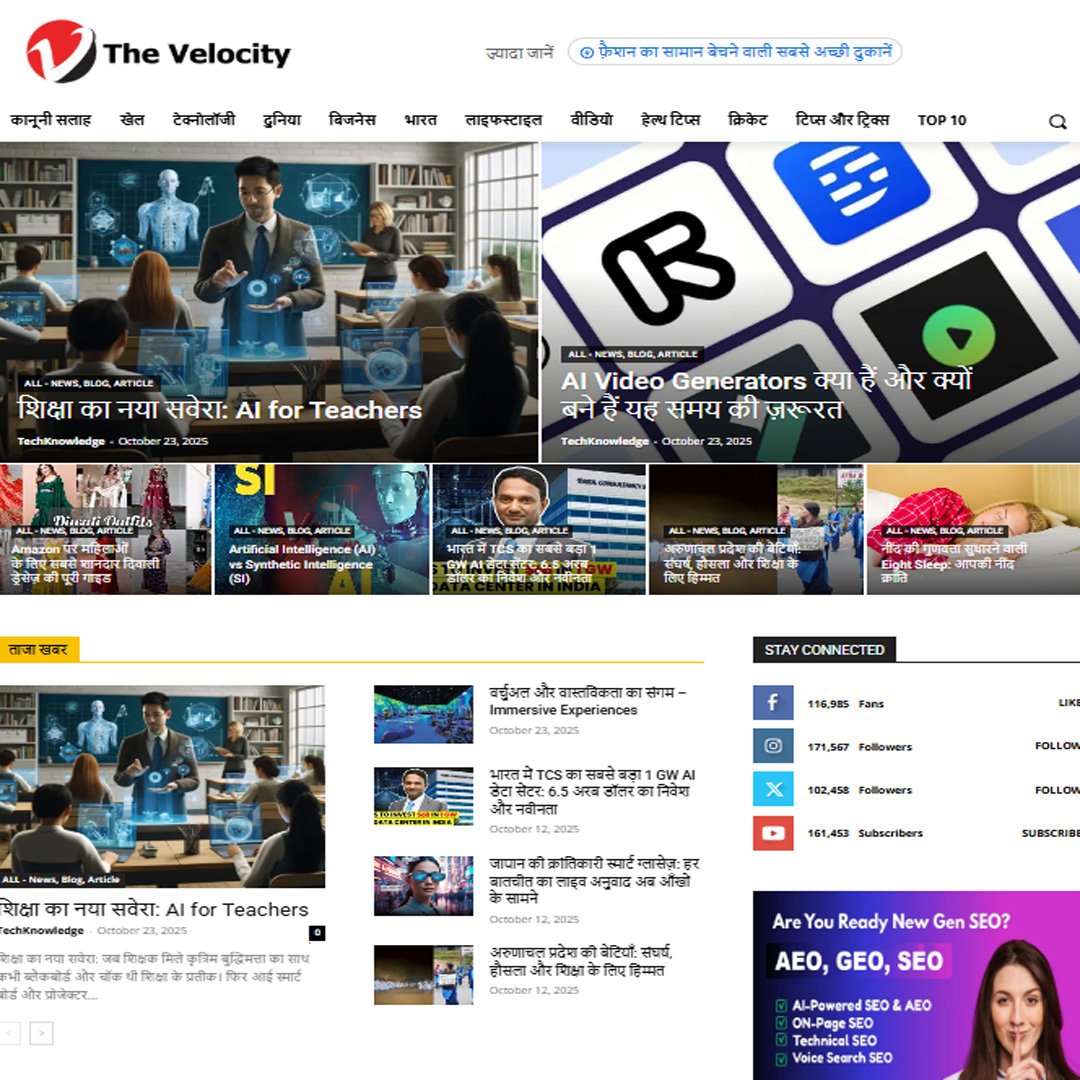There was a time when producing a professional video required lighting crews, cameras, editors, and weeks of work. Today, a few lines of text and an AI video generator can do in minutes what once took entire teams. This isn’t science fiction—it’s the new creative reality.
Over the past two years, AI video generators have exploded in both innovation and adoption. From small creators turning scripts into cinematic shorts to global brands producing marketing clips at record speed, the technology has shifted how we view creativity itself. According to market data from Bloomberg Intelligence, the global generative AI video market is projected to surpass $25 billion by 2027, growing at an exponential pace.
Behind this growth is a simple but powerful force — the democratization of storytelling. Anyone, regardless of budget or skill, can bring ideas to life in high-definition motion.
How AI Video Generators Actually Work
Unlike traditional video editing tools that require manual inputs, AI video generator platforms rely on deep learning models trained on vast datasets of motion, voice, and expression.
They understand natural language prompts — such as “a sunset over the Himalayan mountains with an inspiring narration”— and then synthesize visuals, sound, and transitions that reflect the request. The backbone of these systems combines multiple neural architectures:
- Text-to-video diffusion models that simulate how frames evolve from textual cues.
- GANs (Generative Adversarial Networks) to enhance realism and reduce noise.
- Speech synthesis AI to blend human-like voiceovers.
- Computer vision layers that understand emotion, lighting, and spatial depth.
This integration creates the illusion of professional cinematography — all from an input that starts with text.
Alt text (English): Illustration showing AI neural networks creating realistic video frames from text descriptions.
The Global Momentum: Who’s Leading the Wave
Several startups and tech giants are at the forefront of this revolution. Companies like Runway ML, Pika Labs, Synthesia, Kaiber AI, and Stability AI have built creative ecosystems where users generate video without cameras.
For instance, Synthesia’s platform enables users to create realistic corporate explainers using digital avatars that speak multiple languages. Runway ML, on the other hand, powers creative storytelling with tools integrated directly into filmmaking workflows, as seen in the movie Everything Everywhere All at Once, which used Runway for surreal visual scenes.
Meanwhile, Meta, Google DeepMind, and NVIDIA are pushing the frontier with research models capable of generating higher frame rates, real-time rendering, and near-cinematic realism.
The competition isn’t only about accuracy or quality—it’s about redefining how fast and how personally one can create.
Storytelling in the Age of AI Creativity
Storytelling has always been a human art. Yet, AI video generator technology doesn’t destroy this essence—it amplifies it. Think of a teacher in a rural school who wishes to show her students the history of the solar system. With AI tools, she can create an immersive video tour of the planets without needing a graphics team.
Or an independent journalist who wants to visualize complex humanitarian data — an AI video generator can transform static charts into narratives that move and emotionally connect audiences.
This shift represents a merging of logic and imagination. Where algorithms meet emotion, a new form of creativity emerges — one not defined by technical skills but by vision.
Alt text (English): An individual using an AI text-to-video interface representing the fusion of creativity and technology.
The Democratization of Media
One of the most profound outcomes of AI video creation is accessibility. Previously, producing high-quality media required high capital. Now, students, NGOs, startups, and even small-town artists can craft engaging visuals for a global audience.
This democratization has led to a surge in micro-creators — individuals who use short-form AI videos to share knowledge, humor, and activism online. Platforms like YouTube, TikTok, and X (formerly Twitter) are filled with AI-generated pieces that rival studio-level quality.
In places like India, Africa, and Southeast Asia, this revolution carries deeper social meaning. Local languages, folklore, and regional education stories are gaining digital representation, powered by AI’s ability to translate and visualize diversity.
Emotional Intelligence Meets Artificial Intelligence
Every successful video, whether AI-made or not, resonates because it triggers an emotion.
Modern AI video generators have begun understanding not just images but emotional context — the subtle cues that make a scene warm, tense, or joyful. Through sentiment analysis and facial expression simulations, they craft characters that feel alive.
This is why brands are rushing to use AI-driven personalization. Imagine a travel company showing each viewer a custom vacation video based on their preferences. That’s not hypothetical anymore — it’s already here.
The Ethical Crossroads: Creativity vs. Fabrication
As with every technological leap, AI video generation faces moral dilemmas. Deepfakes, misinformation, and impersonation risks loom large. The same tools that produce educational marvels can also fabricate false events with alarming realism.
Legislators and researchers are actively addressing these challenges. The EU AI Act and similar U.S. policies are building frameworks to classify generative tools based on risk levels. Tech companies now embed watermarking and digital provenance systems to trace video origins.
The debate is heated, but necessary. The question is not just “what can AI create?” — it’s “what should it create?”
Alt text (English): Split visual showing ethical vs. unethical uses of AI-generated videos.
Real-World Case Studies: Brands, Filmmakers, and Educators
1. Coca-Cola’s “Create Real Magic” Campaign
Coca-Cola used a generative AI video platform to invite consumers to co-create branded content. The videos generated by users became viral, earning millions of organic impressions — a testament to participatory creativity.
2. Online Education Platforms
EdTech startups in India used AI video generators to mass-produce lessons in regional languages, cutting production costs by nearly 60%.
3. Independent Filmmakers
Cinematographers use AI to previsualize scenes and generate storyboards, turning dream sequences and impossible worlds into frame-by-frame visualizations before shooting.
The Rise of AI Video Startups
As investment floods into creative AI, new startups emerge each quarter. Analysts report over 300+ startups globally within the AI video creation and editing space in 2025.
Prominent categories include:
- Corporate video automation (marketed to HR, e-learning, and brand communication teams)
- Entertainment and short-film generation
- Metaverse and gaming content creation
- Translation and dubbing through AI avatars
These tools are now parts of SaaS ecosystems, allowing seamless integrations with CRMs, ad managers, and social publishing platforms.
How AI Video Generators Will Shape Journalism and Media
For journalists, the implications are seismic. Reporting can now become visual storytelling. A journalist covering climate change can use an AI video generator to turn data and testimonies into animated explainers within hours.
Newsrooms, struggling with cutbacks, find this especially transformative. AI handles editing and visual design, freeing human reporters to focus on investigation and authenticity.
However, this power must be double-edged with transparency. All AI-assisted media requires disclosed labeling to maintain audience trust.
The Emotional Economics of AI Creativity
In a digital world saturated with visuals, emotional engagement drives attention. AI videos allow marketers and content strategists to test multiple emotional tones — curiosity, nostalgia, humor — using predictive analytics.
The economics of video creation have changed. What once cost thousands of dollars can now be achieved for a fraction of that amount. According to HubSpot’s 2025 Marketing Report, 68% of businesses said generative AI has improved their content ROI within six months.
Yet emotion cannot be automated. Humans remain the soul behind prompts. The tools only channel that vision faster.
Future Trends Beyond 2025
- AI-driven actors that can perform complex human emotions.
- Ultra-personalized experiences, where every consumer sees a tailored video narrative.
- Real-time text-to-video streaming, enabling live creative storytelling.
- AI co-directors — hybrid systems assisting human filmmakers on set.
- Ethical watermark systems integrated with blockchain verification.
AI creativity is moving toward hyperrealism mixed with moral responsibility. The balance between human ethics and machine efficiency will define the next chapter of culture.
Why This Trend Is Unstoppable
Every major creative evolution — printing press, photography, internet — faced skepticism. AI video generation is no different. But the trajectory is clear: it is not replacing artists; it is expanding what art means.
For the young creators of today, code and imagination are currencies of the same creative economy. The ability to dream visually with machines is shaping how humanity sees itself.
Alt text (English): Futuristic depiction of humans and AI collaborating to create visual art together.
Reflective Conclusion
AI video generators are not just another software category; they’re the new ink of the digital age. They allow our ideas to move, speak, and feel, shrinking the distance between imagination and visual reality.
The real question now is — will we use them to elevate truth and creativity, or will we let them blur the line between what’s real and what’s made? The answer lies in our collective wisdom as creators, teachers, and thinkers.
Let’s keep that conversation alive. Share your thoughts, debate the ethics, and imagine how we, as humanity, can tell our stories better — together.









